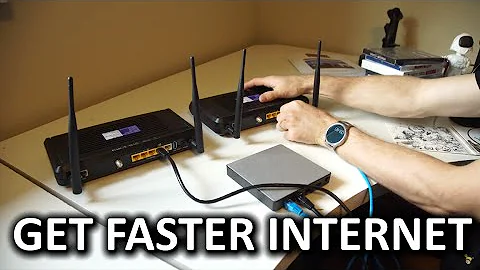How do you test the network speed between two boxes?
Solution 1
I use iperf. It's a client server arrangement in that you run it in server mode at one end and connect to its from another computer on the other side of the network.
One both machines run:
sudo apt-get install iperf
We'll start an iperf server on one of the machines:
iperf -s
And then on the other computer, tell iperf to connect as a client:
iperf -c <address of other computer>
On the client machine, you'll see something like this:
oli@bert:~$ iperf -c tim
------------------------------------------------------------
Client connecting to tim, TCP port 5001
TCP window size: 16.0 KByte (default)
------------------------------------------------------------
[ 3] local 192.168.0.4 port 37248 connected with 192.168.0.5 port 5001
[ ID] Interval Transfer Bandwidth
[ 3] 0.0-10.0 sec 1.04 GBytes 893 Mbits/sec
Of course, if you're running a firewall on the server machine, you'll need to allow connections on port 5001 or change the port with the -p flag.
You can do pretty much the same thing with plain old nc (netcat) if you're that way inclined. On the server machine:
nc -vvlnp 12345 >/dev/null
And the client can pipe a gigabyte of zeros through dd over the nc tunnel.
dd if=/dev/zero bs=1M count=1K | nc -vvn 10.10.0.2 12345
As demod:
$ dd if=/dev/zero bs=1M count=1K | nc -vvn 10.10.0.2 12345
Connection to 10.10.0.2 12345 port [tcp/*] succeeded!
1024+0 records in
1024+0 records out
1073741824 bytes (1.1 GB) copied, 9.11995 s, 118 MB/s
The timing there is given by dd but it should be accurate enough as it can only output as fast the pipe will take it. If you're unhappy with that you could wrap the whole thing up in a time call.
Remember that the result is in megabytes so multiply it by 8 to get a megabits-per-second speed. The demo above is running at 944mbps.
Solution 2
Same as Oli's recommendation for iperf. Just want to add several points:
- There are also windows clients that enables testing across platforms.
-
-t <seconds>changes the test length.-P <n>changes the number of simultaneous connections. For example,iperf -c [target IP] -P 10 -t 30tests 10 connections together for 30 seconds and gives aggregated results along with 10 separate connection speeds. - You don't need sudo. You can simply download the binary at http://iperf.fr/. It should work. Download it with
wget, make it executable withchmod, and you can directly run the binary. It works perfectly.
I found that, using default settings, the single connection speed fluctuates quite a bit. However, with 3+ parallel connections, the results are more consistent on my gigabyte switch. (consistently @ 910-920Mbps)
Solution 3
The command below does not require additional packages but SSH access:
ssh [email protected] 'dd if=/dev/zero bs=1GB count=3 2>/dev/null' | dd of=/dev/null status=progress
Example output:
2992238080 bytes (3.0 GB) copied, 27.010250 s, 111 MB/s
5859375+0 records in
5859375+0 records out
3000000000 bytes (3.0 GB) copied, 27.1943 s, 110 MB/s
The command prints a 3GB (1000^3 bytes) dummy file full of zeros to stdout on the remote server, which is printed (transferred) via SSH to stdout of the local server and then locally piped to /dev/null (i.e. ignored). You can even see the progress of the test while executing it.
Certainly not as precise as other tools but my use case was to debug a backup process where I wanted to test if network speed was the issue without installing additional packages.
Solution 4
Using this script you can easily test connection speed between your machine and some remote host. Example of using:
$ scp-speed-test.sh user@remote_host 80000
-
user@remote_hostis your destination host (you must have ssh-access to this host) -
80000is the approximate size of test file (in kbs), which will be received to the remote host. It is not mandatory argument.
Solution 5
If you want to test your Ethernet LAN at a lower level you can use Etherate which is a free Linux CLI Ethernet testing tool:
https://github.com/jwbensley/Etherate
Throwing it in the mix as tools like iPerf (which are very good!) operate over IP and TCP or UDP. Etherate tests directly over Ethernet / OSI layer 2.
Related videos on Youtube
Jacob Schoen
Updated on September 17, 2022Comments
-
Jacob Schoen over 1 year
I have a gigabit network set up in my house and a few Ubuntu based boxes. Out of complete curiosity I would like to check the speed between the two boxes. I am not having any problems with speed or anything, it really is just the geek in me that is curious. Plus maybe the results will let me know if there is room for improvement, or that I have something configured wrongly.
So how do you properly test the network speed between Ubuntu boxes?
-
Oli over 13 yearsThat shows network latency which is only one part of speed. For example my phone's 3G connection has huge latency (100-300ms) but it can still manage a throughput of 5mbps.
-
Jacob Schoen over 13 yearsMan you have all the answers to my questions! My network apparently is not set up as well as yours only transfer at 714 MBytes and bandwith of 598 Mbits/sec. Dunno may look into that in the future. Thanks.
-
Oli over 13 yearsIn fairness the other box is only one switch (and 20meters of cat5e) away and there's no congestion. 600mbps is still pretty fast.
-
Steffan over 10 yearsThis is great, but I don't have root access to the server.
-
wujj123456 about 10 yearsTry -P 10. My result with single connection is similar to jschoens, but with 3+ parallel connections, it consistently pushes 920Mbps.
-
CMCDragonkai over 8 yearsWhat if you don't control the server?
-
Oli over 8 years@CMCDragonkai You probably shouldn't testing resources that aren't yours. Bandwidth heavy tests can have an impact on short-term stability.
-
 sudo over 7 yearsThis seems to test the speed of the SCP application, which will be lower than a test at a lower layer. For example, nc uses L4. Of course, this is great if you care more about the speed of SCP.
sudo over 7 yearsThis seems to test the speed of the SCP application, which will be lower than a test at a lower layer. For example, nc uses L4. Of course, this is great if you care more about the speed of SCP. -
 sudo over 7 yearsIf you're using TCP,
sudo over 7 yearsIf you're using TCP,iperfmight be faster thanncbecause of the way they use TCP. See: serverfault.com/questions/296539/… -
 deathangel908 over 6 years
deathangel908 over 6 yearsiperfshows 27Mbit speed on gigabit connection, I tried to increased Windows size but it doesn't work. -
developer over 6 yearsNot my fault if he asked speed but wanted throughput.
-
 Xen2050 over 6 yearsHas problems: This script writes & reads a file to disk - that's slower than ram, so can be an artificial slowdown. Also only sends zeros, in case they're compressed that's a big artificial speedup. If you do want pseudorandom data, don't use
Xen2050 over 6 yearsHas problems: This script writes & reads a file to disk - that's slower than ram, so can be an artificial slowdown. Also only sends zeros, in case they're compressed that's a big artificial speedup. If you do want pseudorandom data, don't use/dev/random(it can block) orurandom(link comments suggested that) they can be very slow too, instead use a dm-crypt (See cryptsetup's FAQ 2.19 How can I wipe a device with crypto-grade randomness?) maybe with a file in ram. -
 Xen2050 over 6 yearsHow are these different from each other, and from iperf? Do they work the same, what do they do? nuttcp is in Debian & apparently "nuttcp is based on nttcp, which in turn was an enhancement by someone at Silicon Graphics (SGI) on the original ttcp, which was written by Mike Muuss at BRL sometime before December 1984, to compare the performance of TCP stacks by U.C. Berkeley and BBN to help DARPA decide which version to place in the first BSD Unix release."
Xen2050 over 6 yearsHow are these different from each other, and from iperf? Do they work the same, what do they do? nuttcp is in Debian & apparently "nuttcp is based on nttcp, which in turn was an enhancement by someone at Silicon Graphics (SGI) on the original ttcp, which was written by Mike Muuss at BRL sometime before December 1984, to compare the performance of TCP stacks by U.C. Berkeley and BBN to help DARPA decide which version to place in the first BSD Unix release." -
wullxz about 6 yearsLatency is reaction-time, not speed.
-
THESorcerer almost 6 yearsthis is a nice solution, bunt unfortunately, is NOT GOOD, both solutions give fake answers, iperf is REALLY BAD, I get even 75mbps, netcat is better, but also fluctuate ... both solutions aren't good be cause they are about client/server not advanced enough for squeezing every bit of speed, I'll post my solution as an answer
-
Fusca Software almost 5 years9.5M * 8 = 76 mbps ; it is quite near to 75 mbps
-
Jono over 4 yearswhat if the client is a windows machine?
-
Oli over 4 years@jonney ncat might be viable substitute for an option for acting as one side of the
nccommand above, otherwise I'd suggest WSL. If all else fails, a LiveUSB stick with Ubuntu on. -
Jack G almost 4 years@Oli Please do not use WSL. It's a disgusting abomination against the freesoftware movement. It's okay for hooking and grabbing people into Linux who would otherwise refuse to try it, but developers should avoid it at all costs. Stick to the real actual good Linux, not the flimsy WSL Linux pasted on top of all the evil proprietary Microsoft crap.
-
Oli almost 4 years@JackGriffin Please leave the preaching in church. Somebody had an existing Windows install at one end of this problem and wanted to apply my solution. WSL isn't a bad option in that case.




